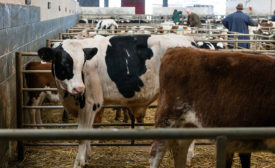Expert Commentary
Regulations & Legislation
FDA sanitary transportation rule does not automatically exempt meat, poultry
Read MoreRegulations & Legislation
Adulterated-product handling clarifications
FSIS revised directive on identifying, segregating and holding adulterated product.
Read More
Get our new eMagazine delivered to your inbox every month.
Stay in the know with The National Provisioner's comprehensive coverage of the meat and poultry processing industry.
SUBSCRIBE TODAY!Copyright ©2024. All Rights Reserved BNP Media.
Design, CMS, Hosting & Web Development :: ePublishing














